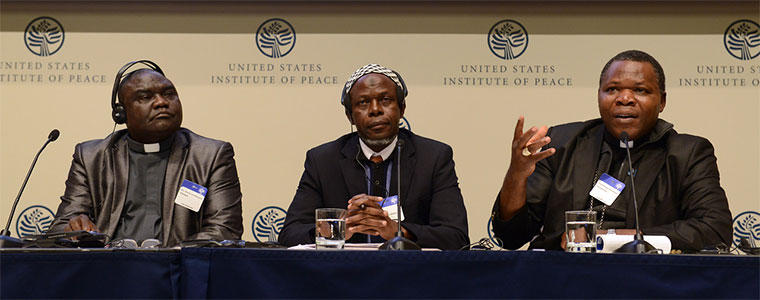Peacebuilding in Central African Republic: The Views of Top Religious Leaders
Read the Event CoverageOn November 10, USIP held a discussion with the highest-ranking Muslim, Catholic, and Protestant leaders in CAR, Imam Omar Kabine Layama, Archbishop Dieudonné Nzapalainga and Reverend Nicolas Guérékoyame Gbangou, as they discussed their efforts to foster dialogue and social cohesion across religious dividing lines, and lay out a strategic vision for the future of the country through their Interfaith Peace Platform.

In the Central African Republic, the situation remains precarious as ethno-religious violence continues despite the deployment of United Nations peacekeepers. In this context, religious leaders committed to peacebuilding provide a particularly important perspective.
On November 10, USIP held a discussion with the highest-ranking Muslim, Catholic and Protestant leaders in CAR, Imam Omar Kabine Layama, Archbishop Dieudonné Nzapalainga and Reverend Nicolas Guérékoyame Gbangou. They discussed their efforts to foster dialogue and social cohesion across religious dividing lines, and lay out a strategic vision for the future of the country. Their Interfaith Peace Platform works tirelessly to spread peaceful messages in villages nationwide, advises political leaders and shares a Central African vision of peace with the international community.
Their work has been recognized by TIME, which placed them among the 100 most influential people in the world in 2014, and by Search for Common Ground’s Common Ground Award, which they will receive later this year. The event was co-sponsored by Catholic Relief Services, Search for Common Ground and the Alliance for Peacebuilding.
Speakers
Imam Omar Kabine Layama
President, Central African Islamic Community
Archbishop Dieudonné Nzapalainga
Catholic Archbishop of Bangui
Reverend Nicolas Guérékoyame Gbangou
President of the Evangelical Alliance of the Central African Republic
Amb. Larry Wohler, Moderator
Former U.S. Ambassador to the Central African Republic
David Smock, Introductory Remarks
Director, Religion and Peacebuilding Center, USIP



